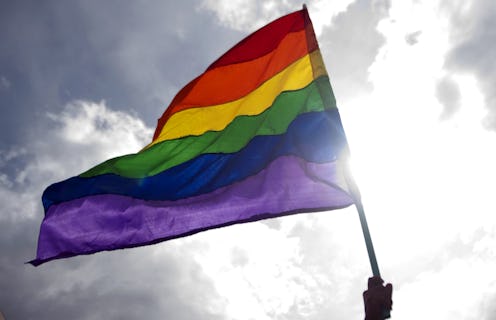There's some frightening news concerning the rights of transgender people is coming out of South Dakota: Lawmakers are working to pass a trans bathroom bill in South Dakota. If approved, South Dakota would become the first state in the United States to require all students to use the bathroom and locker room which corresponds with the gender assigned to them at birth — regardless as to whether or not it also corresponds to the gender they identify as. As of right now, the bill has passed in the Senate with a vote of 20-15 and has been moved along to Governor Dennis Daugaard. Daugaard has been supportive of the bill in the past, but he is reportedly taking time to think about it before signing it into effect.
For the transgender community, this bill becoming law would be a devastating step backwards in terms of equality. In spite of significant steps forward made in recent years for general LGBTQ equality, the transgender community continues to suffer at a disproportionate rate compared to their cisgender peers. Even taking a step back from the issue of access to bathrooms for transgender people, the transgender community faces incredible obstacles when it comes to pursuing every day life, safety, and security.
For instance, one in five transgender people report being discriminated against when seeking a home according to the National Center for Transgender Equality (NCTE), and one in 10 report being evicted from a home once their gender identity was revealed. Most states also do not provide protections for the transgender community against employment discrimination.
For transgender youth, statistics can appear even more bleak. According to the Youth Suicide Prevention Program, studies show that most transgender youth attempt suicide at least once before the age of 20. In school, 75 percent of transgender students report feeling unsafe to the NCTE, and over 60 percent report experiencing cyberbullying.
Supportors of the bill in South Dakota have relied on problematic language and stereotypes to argue their point. The use of this rhetoric serves to create a painful cycle of misinformation, which further perpetuates transphobia — thereby also highlighting countless negative stereotypes faced regularly by the transgender community. Here are three examples of this kind of language drawn from supporters of the bill, and why it's so harmful.
1. "It's about protecting the kids."
At a recent rally, Republican Senator David Omdahl stated that the bill is about "protecting the kids." The problem, however, is that it only "protects" cisgender youth; by its very nature, it does not protect transgender youth. The idea that cisgender people need to be "protected" from transgender people is distressingly common; transphobic language paints trans people as dangerous or villainous in some way, which leads to the idea that the transgender population should be kept separate from the cisgender population. In fact, while transgender youth report higher levels of bullying, harassment, and sexual assault than their cisgender peers, I can find no studies or evidence supporting the assertion that trans youth are somehow harmful or risky for cisgender students to be around.
2. "I'm sorry if you're so twisted..."
Omdahl said this at the same event as the previous statement, and it plays into the prevalent stereotype that transgender people are somehow "unnatural." The media frequently perpetuates this stereortype; in film and television, representation of transgender people is minimal, and even when trans characters do exist, they're often cast as either the victim or the villain. The idea that transgender people are "twisted" is harmful in many ways: It dehumanizes people, creates a layer of "otherness," and — perhaps worst of all — implies wrongness or brokenness.
And there's more to this statement, as well. Here's how that sentence about "twistedness" finishes up:
3. "...You don't know who you are."
Wrong. The idea that trans people are just "confused" is factually incorrect. Recent studies actually find that transgender youth identify as confidently and consistently with their gender identity as cisgender youth do. Identifying as transgender is not "just a phase" or something people do "for attention." This misconception is rooted in traditional gender norms and societal ideas of what gender and sex are and how they're determined.
Politicians hold a lot of privilege and power, but historically, there have only been a handful of times an openly transgender person has held office in a state legislative position in our country. An openly transgender person, to my knowledge, has never held the highest offices in our government: No Presidents, Vice-Presidents, Supreme Court Justices, or members of Congress have openly identified as transgender. This lack of visibility matters when we talk about making laws about other people's rights, without having representation in the room. And when transphobic rhetoric and stereotypes are being used as a justification? To me, this is definitely evidence of a major inequality for the transgender community. I believe we can work on it through better education and advocacy — but we still have a long, long way to go.
Images: Giphy (3)
